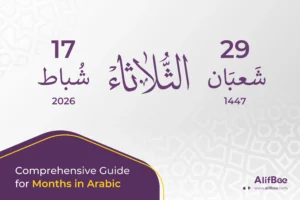7 Most Famous Arabic Islamic Phrases
Many of us, perhaps even you, hear phrases like Inshallah إِنْ شَاءَ ٱللَّٰهُ or Alhamdulillah ٱلْـحَـمْـدُ لله in movies, while travelling, or in conversation with Muslim friends, and wonder what that means?
These beautiful Islamic phrases in Arabic convey profound messages of faith, gratitude, and respect, and Muslims worldwide use them in their daily conversations.
And yes! You can learn them too. You don’t need to be Muslim or even fluent in Arabic to learn these common Muslim sayings. Whether you are a language learner, travelling to the Arab world, or simply interested in Islamic culture, this guide is for you.
In this article, we’ll go through seven of the most common Islamic phrases in Arabic. We’ll learn how to pronounce each one, what it means, and when to use them, along with examples and tips to help you remember and use them with confidence.
Let’s go!
Why Arabic Islamic Phrases Are So Widely Used
So why are these Islamic Arabic phrases so common? Well, it’s simple. They’re short, powerful expressions that carry a lot of meaning without needing a long explanation, and Muslims use them all the time.
Arabic Islamic phrases are rich in meaning and deeply emotional. For example, you might always hear a Muslim say Bismillah before starting a meal. It’s a simple way to invite blessings. Or Alhamdulillah to express thanks when something good happens. During Eid, you might even hear AllahuAkbar echoing through the streets as people gather for prayer.
Muslims around the world use these Arabic phrases regularly, not just in religious settings, but in everyday situations. They’re part of how people live, connect, and reflect on life.
As a result of this regular interaction, many Arabic learners start picking them up early because they’re simple and easy to remember, even if you’re just starting.
Let’s explore them together!
Phrase 1: Inshallah إِن شَاءَ اللَّهُ
If God wills
in-sha-Allah
إِنْ شَاءَ ٱللهُ
Inshallah Meaning
In shāʾ Allāh or Inshallah means “If Allah wills” or “God willing.”
We say it when talking about the future, before plans, hopes, or promises. For example: “I’ll see you tomorrow, In shāʾ Allāh,” or “We’ll finish this project soon, In shāʾ Allāh.”
It expresses both hope and humility and act as a reminder that while we plan and act, only Allah knows what will truly happen.
It’s not a way of avoiding responsibility, as some people mistakenly think. It’s actually a way of keeping faith and realism in balance.
Examples
I’ll see you tomorrow, Inshallah.
arāka ghadan, in-sha-Allah
أَراكَ غَدًا، إِنْ شَاءَ اللهُ
We’ll finish the project next week, Inshallah.
sanunhī al-mashrūʿ al-usbūʿ al-qādim, in-sha-Allah
سَنُنهي المَشروعَ الأُسبوعَ القادِمَ، إِن شاءَ اللهُ
Phrase 2: Mashallah مَا شَاءَ اللهُ
What God has willed
ma-sha-Allah
مَا شَاءَ ٱللهُ
Mashallah Meaning
Mashāʾ Allāh or Mashallah means “What Allah has willed.”
We say it when they see something beautiful, successful, or admirable, like a child’s smile, someone’s achievement, or a stunning view. It’s a way of expressing admiration without envy, and of recognizing that all good things happen by Allah’s will.
For example, if a friend gets a new job, you might say: “Mashāʾ Allāh, that’s wonderful!” — which combines both congratulations and a blessing.
This phrase reminds us to celebrate others’ blessings with sincerity and gratitude, not jealousy.
Examples
Your baby is so cute, Mashallah.
ṭifluka jamīl jiddan, ma-sha-Allah
طِفلُكَ جَميلٌ جِدًا، مَا شَاءَ اللهُ
Mashallah, your Arabic has improved a lot!
ma-sha-Allah, laqad taḥassanat lughatuka al-‘arabiyyah kathīran
مَا شَاءَ اللهُ، لَقَد تَحسَّنَتْ لُغَتُكَ العَربيةُ كَثيرًا
Phrase 3: Alhamdulillah الحَمدُ لِله
Praise be to Allah/God
al-hamdu-lillah
ٱلْـحَـمْـدُ للهِ
Alhamdulillah Meaning
Alhamdulillah is used to express gratitude, whether for something big, like recovering from illness, or something small, like finding a lost key.
It’s said after meals, when someone asks how you’re doing, or even in tough times, as a way of remembering that there’s still good in every situation. By saying Alhamdulillah, you’re not pretending life is perfect; you’re choosing to see blessings even when things aren’t easy.
Examples
I passed the exam, Alhamdulillah!
najaḥtu fī al-imtiḥān, al-hamdu-lillah
نَجَحتُ في الاِمتِحانِ، الحَمدُ لِلهِ
I’m doing well, Alhamdulillah.
anā bikhayr, al-hamdu-lillah
أَنا بِخَيرٍ، الحَمدُ لِلهِ
Phrase 4: Astaghfirullah أَستَغفِرُ اللهَ
Seek forgiveness from Allah/God
As-tagh-fi-ru-llah
أَسْتَغْفِرُ ٱللهَ
Astaghfirullah Meaning
Astaghfirullah means “I seek forgiveness from Allah.”
We say it when we realize we’ve made a mistake, spoken harshly, or simply want to cleanse our hearts of negativity. It’s a reminder that no one is perfect — and that turning back to Allah is always possible.
The phrase can also be said when witnessing something wrong, as a quiet way of expressing disapproval while keeping one’s heart humble. In everyday life, many people repeat Astaghfirullāh throughout the day to stay mindful and spiritually grounded.
Examples
Astaghfirullah for forgetting my prayers.
astaghfirullah li'annī naseytu ṣalātī
أَستَغفِرُ اللهَ لِأنَّني نَسِيتُ صَلاتي
Astaghfirullah, that was not right to say.
astaghfirullah, lam yakun min al-ṣawāb qawl dhālik
أَستَغفِرُ اللَهَ، لَم يَكنْ مِنَ الصَّوابِ قَولُ ذَلكَ
Phrase 5: Subhanallah سُبحانَ اللهِ
Glory be to Allah/God
Sub-hana-llah
سُبْحَانَ ٱللهِ
Subhanallah Meaning
We say Subhanallah when we see something beautiful like a sunset, a newborn baby, or a moment that takes their breath away. It’s a spontaneous way of admiring creation while recognizing that all beauty and perfection belong to God.
The word Subḥān comes from the root s-b-ḥ, which carries the idea of being free from any flaw or imperfection. So when someone says Subḥān Allāh, they’re declaring that Allah is far above any weakness or limitation.
It’s a small act of worship that turns moments of surprise or admiration into moments of remembrance, reminding the heart who the true source of beauty is.
Examples
Subhanallah, look at that sunset.
subḥānallah, unẓur ilā hādhā al-ghurūb
سُبحانَ اللهِ، اُنظُرْ إِلى هَذا الغُرُوبِ
Subhanallah, the sky is full of stars tonight.
Subḥānallah, al-samāʾ malīʾah bil-nujūm al-laylah.
سُبحانَ اللهِ، السَّماءُ مَليئةٌ بِالنُّجومِ اللَّيلةَ.
Phrase 6: Bismillah بِسمِ اللهِ
In the name of Allah/God
Bis–mil–lah
بِسْمِ ٱللهِ
Bismillah Meaning
We say Bismillah before starting anything important like eating, studying, driving, or even sending a message. It’s a way of inviting God’s blessing and reminding ourselves that every good action begins with His name.
The full phrase is “Bismillāh ir-Raḥmān ir-Raḥīm” (بِسْمِ اللهِ الرَّحْمٰنِ الرَّحِيم), which means “In the name of Allah, the Most Compassionate, the Most Merciful.” These are the first words of the Qur’an and are recited at the beginning of almost every chapter.
Examples
Bismillah, let’s begin our meal.
bismillah, linabdaʾ wajbatunā
بِسمِ اللهِ، لِنَبدَأْ وَجبَتَنا
I’ll start my journey now, Bismillah.
saʾabdaʾ riḥlatī al-ān, bismillah
سَأَبدَأُ رِحلَتي الآنَ، بِسمِ اللهِ
Phrase 7: Allahu Akbar اللهُ أَكبَرُ
God is the Greatest
Allahu Akbar
ٱللهُ أَكْبَرُ
Allahu Akbar Meaning
We say Allahu Akbar in many moments, like during prayer, when feeling amazed, grateful, or moved by something powerful. It’s a way of remembering that no matter what happens, Allah is greater than everything around us.
Sadly, this peaceful phrase has sometimes been misunderstood or unfairly linked to violence in the media. In truth, it’s one of the most common words of praise in Islam — said by millions every day to express humility, faith, and awe before God, not anger or aggression.
Think of it as a simple reminder that God’s greatness is above all things — a phrase that comforts, unites, and inspires hearts around the world.
Examples
Allahu Akbar, the baby is born!
allahu akbar, laqad wulida al-ṭifl
اللهُ أَكبَرُ، لَقد وُلِدَ الطِّفلُ
He reached the mountain peak, shouting Allahu Akbar!
waṣala ilā qimmat al-jabal wa huwa yahtif: allahu akbar!
وَصلَ إِلى قِمَّةِ الجَبَلِ وَهوَ يَهتِفُ: اللهُ أَكبَرُ!
How to Use Islamic Arabic Phrases Respectfully
If you are new to Arabic or not Muslim, you may ask yourself: “Can I use words like Inshallah or Alhamdulillah?” It’s yes but only when you use these words with due consideration and deep respect.
Each and every one of these phrases hold great significance to Muslim communities as they are all closely connected to their customs and culture. If you wish to use the phrases, you may want to look into the following things:
1. Understand their meaning
Do not learn them to be trendy or “cultured.” Take a few minutes to review how each expression is defined and when people say it and work on the pronunciation.
2. Know when it’s appropriate
Some words like Al-lahu-Akbar or As-tagh-fi-rul-lah are intensely religious phrases. By placing these in the wrong context—and possibly in some instances far too often—these can grate. Determine when to utilize these and when to simply observe.
3. Pay attention to your tone and body language
It’s not what you say but the way that you say it. Be respectful in tone and bodily posture. These are spiritual expressions, so they have to be said sincerely and not in jest or in exaggeration.
4. Let your intention guide you
It makes a difference that you mean to be respectful, to connect, to learn. People will usually perceive that. If you are only saying these words in order to belong, to be funny, people will feel that regardless of how you mean it.
5. Be open to learning
If you’re not quite certain, you can always ask questions and listen. Most native speakers will appreciate your effort and will be more than happy to help you learn to say things properly.
Final word
Now that you know the meaning behind seven common Islamic phrases, you are one step closer to speaking Arabic in a more considerate and personal way.
These words show up in greetings, in thanks, even in quiet pauses and the more you understand them, the more natural they start to feel.
Begin to practice with one or two phrases that you hear regularly. Practice using these in context and don’t expect to get it all right immediately. What you want to focus on most is to say them with sincerity and respect.
If you enjoyed this article, you may like:
- 100 Common Arabic Words – Build your everyday vocabulary.
- 50 Easy Arabic Words for Beginners – Start with simple, useful words.
- Arabic Greetings – Learn how to say hello the right way.
And to learn even more, download the AlifBee app — it’s a fun, friendly way to practice Arabic anywhere, anytime.
See you in the next lesson! and Inshallah “ إِنْ شَاءَ ٱللَه” , your Arabic will keep getting better from here.









